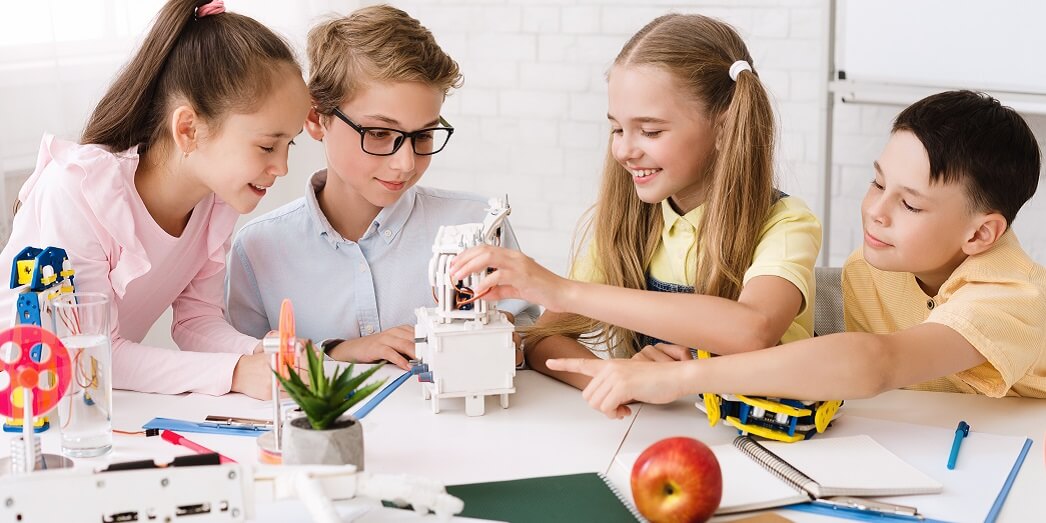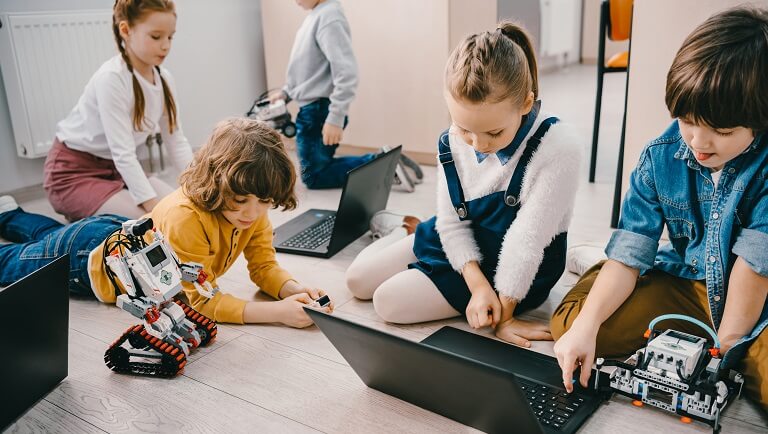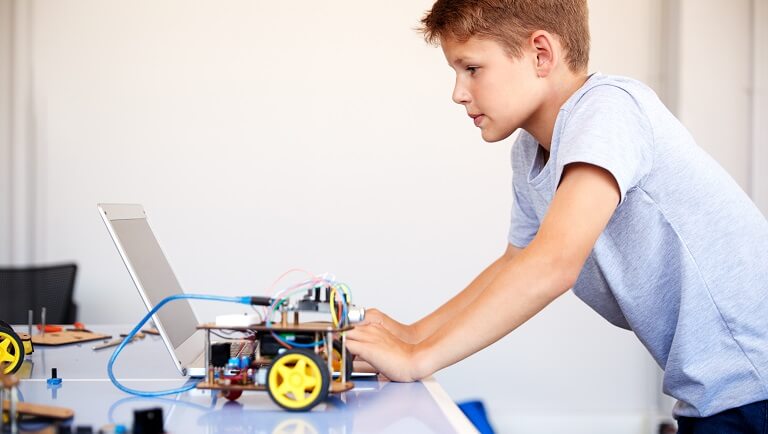
Soft skills vs. Hard skills: what is more important?
It is an indisputable fact that we live in a VUCA world: volatile, uncertain, complex, and ambiguous. Even though that term was introduced in far 1987 by the U.S. Army War College to describe the perception of the world after the end of the Cold War, since then, the speed of changes happening around us has only incremented.
The outbreak of a novel Coronavirus is a shining example of it. Only the most adaptable individuals with a high level of emotional intelligence can overcome difficulties and remain mentally calm and happy in a tough environment. But at the same time, only the most valuable specialists managed to retain their jobs in a time of crisis. Those whose expertise and skills are indispensable to the country’s economy.
So which skills should a parent pay more attention to? Is it more important to develop life skills in a child to help him cope with the changes and not get lost in the future? Or is it better to invest in his tech skills and help him become a sought-after specialist?
Before we can answer these questions, let’s first understand what soft and hard skills are and the difference between them.
What are hard skills?
Hard skills are technical abilities or professional skill sets that are easy to demonstrate and measure. Usually, we learn them at courses and seminars, by reading and studying or going through some specific experience. These types of skills have different levels of difficulty, which you can gradually climb.
Here are some examples of hard skills: mathematics, knowledge of a foreign language, programming, analytical and logical thinking, erudition, the ability to act according to a certain algorithm, etc. Basically, hard skills are traditional academic knowledge that a child learns at school and later in college.

These skills can be quantified by tests and profile exams and confirmed by diplomas and certificates. One of the most popular ways to determine someone’s development of hard skills is to find out his IQ level. As you know, today, it is no longer a competitive advantage but an important prerequisite, a starting point. Therefore, parents cannot abandon the development of hard skills in a child. It is what he will be able to offer to the world in the future.
What will be the most important hard skills in the future?
Although each work field may require a specific set of hard skills, there are tech skills that are useful for everybody and can be considered a prerequisite.
Basic computer and technology-related skills
There is no surprise here as many of today’s jobs require computer skills. The basic ones are the ability to work with operating systems like Windows, macOS, as well as applications like Word, Excel, PowerPoint. Here we can also include speed dialing and the ability to search for information on the Internet.
According to the LinkedIn Learning 2020 Workplace Learning Report, some top hard skills requested in 2021 are connected to a deep knowledge of computing.
- Blockchain technology does not only have to do with cryptocurrencies. Many industries, such as the financial sector, are actively preparing for the widespread adoption of blockchain.
- Scientific computation is the use of computer simulation, numerical analysis, etc., to solve problems in various scientific disciplines.
- Cloud computing is getting computing services like storage, networking, software, databases, etc., over the Internet.
- UX design or user experience design is about designing software that is comfortable and easy to use.
- Artificial intelligence is very popular in technology and business circles. Statistics show that 15% of iPhone owners use Siri’s voice recognition capabilities. Netflix is using artificial intelligence to find the content you would probably appreciate. Another example is a self-driving Tesla car.
- Video production. The video production industry is booming. There is a great demand for video content from internet users. YouTube has become the second largest search engine.
Analytical reasoning
It does not only concern data analysis as a profession. There are many types of occupations that require dealing with a certain amount of information. So the ability to understand and analyze information, generate conclusions based on it is essential in a career and useful in personal life.
Mathematical skills and financial literacy
Mathematics is crucial for many areas of business: finance, IT, construction, accounting, architecture, engineering, logistics, medicine, trade, and others.
With the spread of financial products and services, it is essential to understand how they work and how to use them correctly and responsibly. Nowadays, the lack of such knowledge can lead to poor spending decisions and other mistakes, damaging personal financial stability, and health.
Planning and time management
The ability to plan and organize is closely related to many professions such as project management, marketing, engineering, business analysis, sales, logistics, construction, and so on. Effective time management helps to reduce stress and work smarter in any business field. If you want to achieve greater productivity and be successful in your career and personal life, learning time management techniques is a must.
How to teach a kid hard skills?
You would be surprised to know, but most of the hard skills are inborn. An infant’s brain has twice as many neural connections as an adult’s. Kids are capable of complex thinking and understanding science subjects and math earlier than one year of age. These skills include questioning, planning, and analysis. But the rest depends on whether parents will stimulate the child’s capabilities and his interest in learning.
So that children can effectively master hard skills, they need to feel free to show their interest in different subjects regardless of age and not necessarily following the school curricula.
Parents can unlock their kid’s potential by encouraging them to ask questions, helping them find answers to them. Once a kid shows curiosity in something, a parent should never say anything like: “it is too early to know”, as it demotivates them. In general, it is essential to build an interaction with a child so that he knows that he can ask his parents anything and not worry about their reaction. After all, it is natural for children to want to feel like adults.

There are plenty of home activities that can get kids excited about technology, math, and science. With the growing popularity of STEM education, there have appeared a lot of toys that help kids develop their technical, mathematic, and engineering skills:
- apps and robots that introduce kids to coding;
- creating moving electronic sculptures out of play-doh that teaches them to use materials functionally and combines art and science in one project;
- creating recycled paper using an egg carton, and many more.
Some parents believe that kids get used to technology just by using iPads, smartphones, etc. But that is not true. The difference between a tech activity and an iPad is that the first one teaches how to use technology responsibly using your logic to solve your day-to-day problems, and the latter is mostly used to have fun or stay in touch with friends.
Technology activities do not necessarily include using electronic gadgets and computers but also microscopes, special robotic toys, or simply scissors. Cutting out pieces of paper in certain shapes shows how to use scissors to get the desired shape. It is fun and useful to teach kids to navigate by using a map, a compass, and stars, just like pirates once did. You can calculate the exact coordinates together to find the right spot on the map.
When you keep a child involved in household activities like cooking, making lists, managing expenses, buying food, planning a day, fixing something, he is encouraged to learn and grow. Also, you introduce a child to the concept of time management and teach him to be smart about money. He realizes that he is a part of what is happening in the house and becomes more proactive and independent. He sees no need to wait for his parents to fix something, and he learns to do it himself.
What are soft skills?
Soft skills are social, psychological, emotional, and ethical skills that help a person solve problems in life, to comprehend and «read» people around him. Sometimes they are referred to as personal qualities because they depend on a person’s character and are acquired with experience and sometimes errors.
Basically, they are non-technical skills that have to do with communication, leadership, teamwork, people management, and emotional intelligence. It takes more time to learn soft skills than hard skills, and there is no way to instantly prove that you possess them except for the EQ test.
Unlike hard skills, there are no easy step-by-step instructions for mastering soft skills as they partly depend on personal in-born traits. Mostly they are formed in childhood and develop throughout our life. However, mastering these skills in preschool and school periods is much easier and faster than in adulthood, when your personality is mostly shaped. Therefore, it is important to build a strong foundation for soft skills in a child through quality interaction with family, society, and the world at large.
What are the most valuable soft skills a child needs to develop?
Emotional intelligence helps a person understand his strengths and weaknesses, accept himself and adequately respond to criticism. It allows him to interact with others and be aware of their emotions and needs.

All these qualities reflect how you work and deal with situations in life. That is why in the end, hiring managers chose those candidates who demonstrate a higher level of emotional intelligence. You can say that soft skills are the competencies of the future.
Some of the most requested soft skills are:
- Communication. Any child should know how to properly communicate: how to introduce himself, make friends, negotiate while playing and interacting with other kids. By developing communication skills, the child also learns to accept different points of view.
- Adaptability. This is flexibility in decision-making, the ability to accept change positively and to search for the best solution in any life situation. Also, it is not being afraid of anything new and unknown. In general, children are more adaptive than adults because they have had many negative experiences yet. Therefore, the main task is to maintain this ability, help the child overcome his insecurities, teach searching for solutions, and ask for help if needed.
- Creativity. This includes the capacity to think outside the box and offer creative solutions to specific problems. To think creatively, one needs to be open-minded and curious. There is a great demand for creative people who can generate innovative ideas and create original products or solutions.
- Critical thinking. This is the ability to draw unbiased conclusions by analyzing different points of view. It helps to omit unnecessary facts and details. It is natural for children to ask a lot of questions and question facts. To develop critical thinking in a child, you need to stimulate him to ask questions like «what», «why».
- Leadership and teamwork. These skills are both based on self-confidence. As a leader, a child learns to take responsibility for the decisions he makes and the surrounding people. When working in a group, he learns not to be afraid of the rules and accept them, to endure his role and enjoy it.
- Life-long learning. This is more than a skill. It is a philosophy of living. It helps you learn new skills and master competencies independently, and adapt to changes. The ability to work independently is enhanced during distance learning when a kid needs to prepare for studying and find additional information by himself.
How to help a kid acquire soft skills?
Most soft skills can be taught by personal example. A child adopts patterns of behavior by imitating adults. Parents set communication patterns by openly communicating with people, expressing feelings, asking for help, solving problems. In the same way, you can teach a child good manners: do not forget to say “please” and “thank you”, and you will see that your kid will be using them too.
Furthermore, if he sees that his parents read books, visit museums, exhibitions, start new hobbies, he begins to understand that constant learning is part of our lives.
Children want to feel grown up and be treated like full-fledged people. According to the Self-determination Theory, psychological health depends on the satisfaction of our basic human needs. If a child learns to understand and meet his needs, he will grow up to be an independent adult who responds calmly to difficulties.
Feeling independent, competent, and accepted are these three basic needs. A child needs to know that he can change something if he wants to. So give him this freedom! For example, let him put toys in his own way or choose what to wear when he goes out.
You may also be interested:
Leadership in children: easy ways to develop your child’s leadership qualities and skills 🏆
In the same way, he wants to be sure that if he is given a difficult task, he will cope with it. Management skills often seem like adult skills to parents, but their development needs to begin in childhood. Assign your child to manage a simple process, such as cooking an easy dinner. Or make him in charge of the bread in the house, which is a task with real actions: taking money, going to the store, choosing bread, and bringing it home. This will make a kid feel valuable.
Phrases like “you will understand when you grow up” are wrong. You need to take your child seriously and ask his opinion. And if you give him a choice, it has to be real. For example, asking him what mug he wants to drink milk from is not a real choice. Instead, let him choose what he wants to drink at this moment.
Try modeling empathetic feelings for others. If someone is upset or crying, you can use those moments to teach kindness, caring, and sympathy. You can pick together some of your kid’s old clothes to donate or make a food basket for people in need.
Conclusion
Each child is born with his own personality traits, potential, and «mission» in life. From the moment of birth, he starts to grow and develop so quickly that it is hard to keep track of all the abilities and knowledge he constantly acquires. That is why no parent can know for sure what profession he will choose and what personal development path he will take. Though, it is the parents’ mission to help their child make the most of his life.
If you read a biography of anybody successful, you will notice that all those achievements do not come from just having particular knowledge or technical skills. But also from being capable to effectively communicate with colleagues and peers, propose your ideas, spark people’s interest and organize processes.
As you can see, only the combination of soft skills and hard skills is key to professional success in the 21st century. If you want your child to make a real leap in his personal growth, to become a harmonious person, and find his place in life, you need to find the right balance in developing these two types of skills.

new engaging articles

